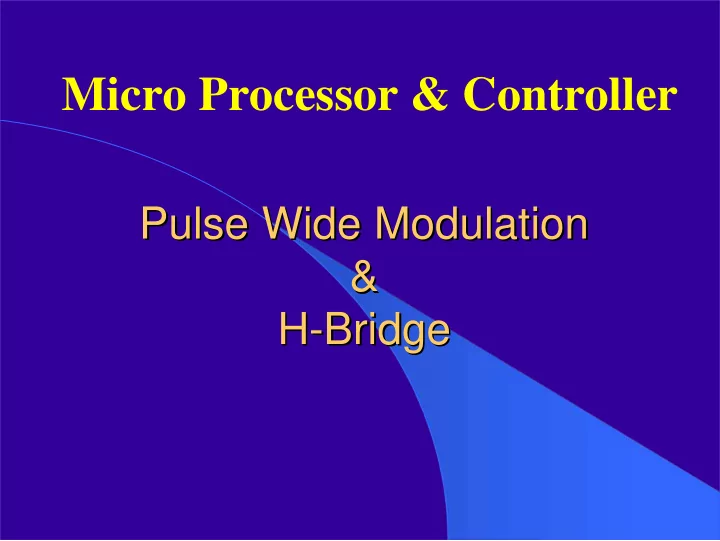

Micro Processor & Controller Pulse Wide Modulation Pulse Wide Modulation & & H- -Bridge Bridge H
Pulse Width Modulation - - PWM PWM Pulse Width Modulation A Pulse Width Modulation (PWM) Signal is a method for generating an analog signal using a digital source. A PWM signal consists of two main components that define its behavior: a duty cycle and a frequency. The duty cycle describes the amount of time the signal is in a ON state as a percentage of the TOTAL time of it takes to complete one cycle. The frequency determines how fast the PWM completes a cycle, and therefore how fast it switches between on and off states. By cycling a digital signal off and on at a fast enough rate, and with a certain duty cycle, the output will appear to behave like an average constant analog signal when providing power to devices.
PWM Applications PWM Applications PWM signals are used for a wide variety of control applications. Their main use is for controlling DC motors but it can also be used to control valves, pumps, hydraulics, and other mechanical and power parts. The frequency that the PWM signal needs to be set at will be dependent on the application and the response time of the system that is being powered. Below are a few applications and some typical minimum PWM frequencies required: • Heating elements: 10-100 Hz or higher • DC electric motors: 5-10 kHz or higher • Power supplies & converter: 20-200 kHz or higher
Robotic Claw Controlled PWM Robotic Claw Controlled PWM 4
Duty Cycle Duty Cycle 5
PWM Used to Control LED Brightness PWM Used to Control LED Brightness 6
H- -Bridge Bridge H A H bridge is an electronic circuit that enables a voltage or current to be applied across a load in either direction. These circuits are often used in robotics and other applications to allow DC motors to run forwards and backwards
H- -Bridge L298 & L293 Bridge L298 & L293 H
Delfino PWM Modules (Dual A&B 1 PWM Modules (Dual A&B 1- -4) 4) Delfino
Time Base Sub- -Module Module Time Base Sub
Time Base Sub- -Module Registers Module Registers Time Base Sub
Counter Compare Sub- -Module Module Counter Compare Sub
Counter Compare Sub- -Module Registers Module Registers Counter Compare Sub
Action- -Qualifier Sub Qualifier Sub- -Module Module Action
Action- -Qualifier Events Qualifier Events Action
Action- -Qualifier Example Qualifier Example Action
Action- -Qualifier Example Code Qualifier Example Code Action
Dead Band Sub- -Module Module Dead Band Sub
Dead Band Sub- -Module Module Dead Band Sub
Dead Band Modes Dead Band Modes
Flax Init PWM Flax Init PWM See the full example in the course site
Recommend
More recommend